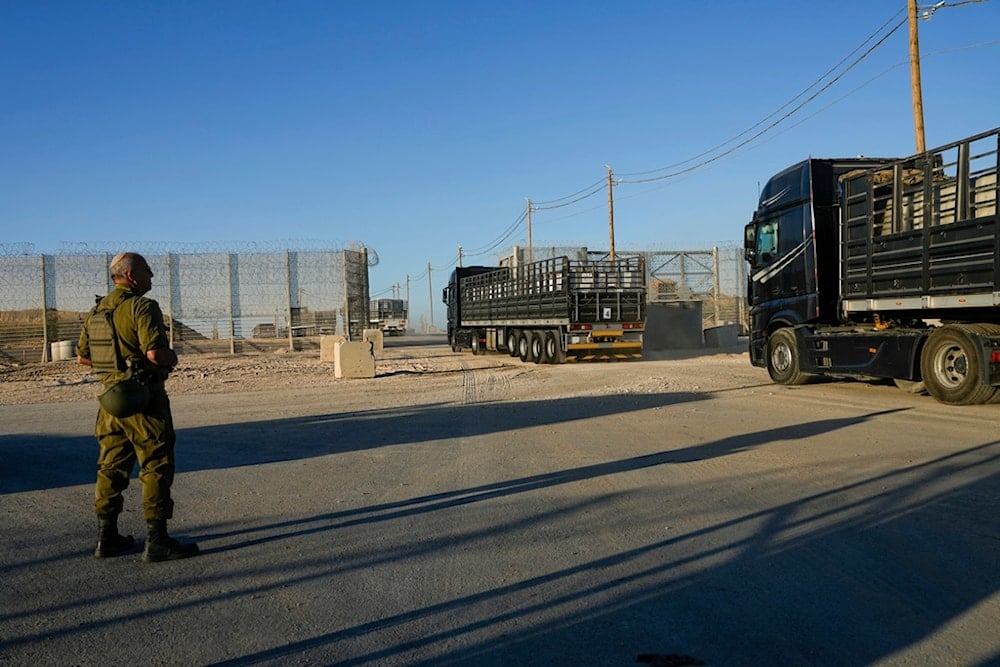Israeli military facilitating Gaza aid looting by gangsters: FT
According to humanitarian officials and Palestinian transporters, these gangs operate with the implicit support of the Israeli occupation forces.
-

Trucks carrying humanitarian aid cross into the Gaza Strip from Erez crossing in southern occupied Palestine, on October 21, 2024 (AP)
Rumors circulated Monday that Gaza’s most infamous gangster, Yasser Abu Shabab, had been killed after local security forces launched a rare ambush against criminal groups, resulting in the killing of up to 22 individuals, Financial Times reported Thursday, noting that the operation followed a wave of armed robberies, including a raid on a convoy of UN aid trucks.
However, just a day later, Abu Shabab resurfaced, the news website mentioned, adding that his group reportedly blocked roads with a burning fuel truck to prevent aid trucks from passing, in an act of retaliation.
It suggested that this bold move highlights the growing influence of Abu Shabab and other criminal gangs in Gaza, who have established a profitable scheme targeting aid trucks entering the besieged Strip.
According to humanitarian officials and Palestinian transporters, these gangs operate with the implicit support of the Israeli occupation military—what a UN memo described as "passive, if not active benevolence" by the Israeli military.
Led by escaped convicts and organized along family lines, these heavily armed gangs have become a major power, operating freely along Gaza’s southern border, an area under strict Israeli control, FT highlighted.
They hijack aid shipments, which are then stored in makeshift bases, seemingly under the radar of Israeli surveillance drones, and sold to impoverished Palestinians at sky-high prices.
Up to 30% of aid stolen
Statements from over 20 individuals—including Palestinian truck drivers, traders, and UN officials—interviewed by FT reveal the increasing frequency of these thefts. The criminal networks have replaced individual looters, and their operations have extended into Gaza’s southeastern border areas, known as a “red zone” due to the Israeli occupation military's presence.
The news website said that since "Israel’s" invasion of Rafah in May, aid deliveries have plummeted, with thefts reaching alarming levels. According to the UN, up to 30% of aid entering Gaza is stolen, with 97 out of 109 UN trucks being lost in a recent heist.
The rise in thefts has had severe consequences for Gaza’s aid supply.
FT cited local transport leader Nahed Shohaybr as saying that he had to turn down multiple UN delivery requests after several drivers were killed by looters, and more than half of his fleet was sabotaged.
Trucks are often intercepted shortly after crossing into Gaza from the Karem Abu Salem crossing, where armed gangs rob them of goods, fuel, and supplies.
100 yards from an Israeli tank without being shot
“One kilometer to the west you’ll find the thieves on the road and in the bombed-out buildings, and all around them are tanks. Why don’t those tanks attack them?” Shohaybr indicated. “For the [Israeli] military, this is a good way of indirectly starving Gaza.”
Some truck drivers recall incidents where their vehicles were surrounded by dozens of armed men, who would shoot the tires and steal everything inside.
While some thefts occur directly on the road, in certain cases, drivers are taken to gang hideouts near the border, where they are held at gunpoint as their trucks are looted in "areas within the eye line and earshot of the Israeli military," one transport broker was quoted as saying.
Several senior UN officials contend that such brazen thefts could not happen without the tacit approval of Israeli occupation forces.
One official stated, “These guys [the gangsters] are probably the only people in Gaza who can get 100 yards from an Israeli tank or Israeli soldiers without being shot."
Meanwhile, unarmed UN escorts and volunteer protection teams have been targeted in Israeli attacks, according to officials and local sources.
'Everything you can imagine'
FT cited Mohammad, a truck driver who has been transporting goods north from Karem Abu Salem for the past 15 years, as saying that he was taken to a gang’s base, where his truck was looted.
Surrounded by vast amounts of stolen goods—flour, canned food, blankets, and medicine—he described the scene, “Everything you can imagine, it was just piled up there. Out in the open: there were no walls, there was no building."
Mohammad also emphasized that the base was less than 2 km from the crossing.
Trucks carrying commercial goods are often held hostage until traders pay a ransom for their release, according to local business leaders.
“They [the gangs] ask for a massive ransom for the commercial goods to be released. Whereas for the aid [from the UN and NGOs] they just take it and sell it in the markets," said Ayed Abu Ramadan, head of Gaza’s Chamber of Commerce.
Gaza families disavowing members involved in theft
UN officials and Palestinian witnesses suggest that the Israeli military's apparent tolerance toward these gangs forms part of a broader strategy to support competing forces and undermine Gaza’s local authorities.
On the other hand, FT mentioned that families are distancing themselves from relatives involved in looting, and some clans have even formed counter-looting committees to protect aid trucks.
The website said that the Abu Shabab clan on Tuesday publicly disavowed any members involved in theft, attempting to deflect growing anger.
While "Israel" continues to blame Hamas for the rise in criminal activity, transport leaders like Shohaybr say the Israeli military is fully aware of what is happening and could stop it if it wanted to.
“If they wanted to, they could call up Yasser Abu Shabab right now and tell him: don’t you dare steal another truck, or we’ll shoot you. But they don’t, and why do you think that is?” he said.
Read more: Israeli army allows gunmen to loot aid trucks entering Gaza: Haaretz

 6 Min Read
6 Min Read








